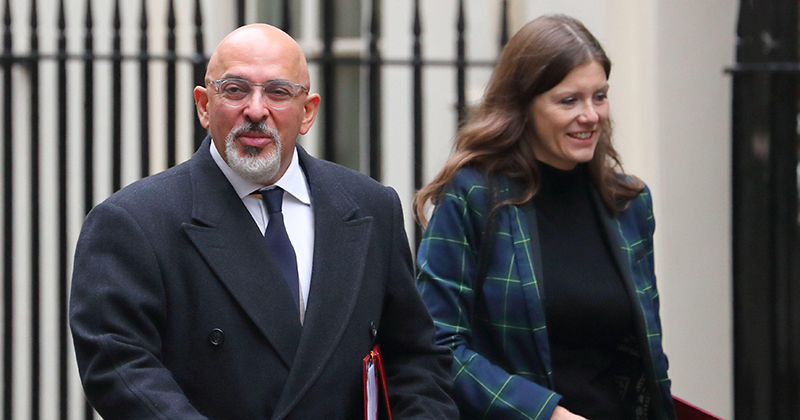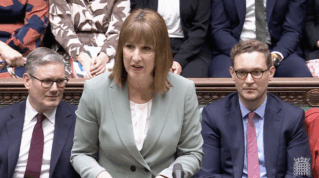With billions of tax cuts promised, who will put their head above the parapet and demand some proper spend on FE? asks Tom Bewick
When the government is in full meltdown, Monty Python style moments of British humour are never very far away.
The new junior education minister, Andrea Jenkyns MP, it appears, gave the middle finger to a ‘baying mob’ outside Downing Street last week. She later apologised.
Of course, this rather predictably led to the ‘be kind’ brigade on social media calling for her resignation – in a manner not too dissimilar from the famous stoning scene in Life of Brian.
Shortly after, we saw pictures circulating of the uber Johnson loyalist, now at DfE and tipped to be skills minister, Brendan Clarke-Smith MP, wearing a face mask covering his private parts.
It all feeds into a rather chaotic narrative.
One akin to drift, dither and decay, of what is now the outgoing Johnsonian administration.
Yet, the temporary changing of guard at Sanctuary Buildings could not have come at a worse time for FE.
Sector insiders will tell you, that ideologically-speaking, DfE officials have been offside with Conservative ministers in the post-Brexit mould for quite some time.
Leadership hopeful for next PM, Suella Braverman MP, perhaps neatly characterised the mood of large swathes of the card-carrying membership, writing in the Telegraph:
‘Napoleon derided Britain as a nation of shopkeepers. We’re in danger of becoming a nation of regulators.’
It will make uncomfortable reading for the new secretary of state, James Cleverly and his relatively inexperienced team of junior ministers.
Because the contours of the coming battles in the leadership contest are already marching over the hill.
For years, the Department and its phalanx of quangos have been gold plating policies and regulations with very little regard for the consequences.
The list of Stalinist-inspired manoeuvres began during the New Labour era; placed on steroids after the general election in 2017.
They include not only the growing intervention in the day-to-day running of the nation’s 24,000 schools (e.g. usurping the role of local authorities via academisation); but the curious takeover of England’s further education colleges as well.
Ian Pryce, principal and chief executive of Bedford College Group, warned his colleagues in a recent opinion piece that they were displaying a kind of Stockholm syndrome:
‘There is a real danger we might sleepwalk into a reversal that might look superficially attractive. Government can be a charming seducer when it comes to presenting captivity as the solution to our current woes’, he said.
And we all know the captivity he is referring to.
Not since the 1870 Balfour Act has government, in effect, set up a national state backed awarding body in FE, as it has done with the roll-out of T Levels.
Whatever the real merits of a qualification that at least tries to address the underlying weakness of our technical education system; it is this very un-conservative ideology that these and other recent policy interventions represent that could increasingly become a battleground.

Because the real problem when the government starts taking ownership of things (qualifications, FE colleges etc.) is that it then has to sustain these newly acquired ‘assets’ it owns in the public sector borrowing requirement.
In practice, that means more civil servants to manage things; higher taxes to pay for them; additional statutory and regulatory instruments; particularly as politicians look to assert control over what they see as part of their domains.
The proposed new regulatory scheme planned to approve funding of level 3 qualifications in future (in England), as outlined in the Skills Act, is just one tiny example of where ministers have unwittingly written a blank cheque out to “the machine” in future.
You don’t have to be a political genius to see that the next prime minister is probably going to call time on this ever-expanding model of the corporatist state.
Particularly when the wages bill in Whitehall is currently running at over £100 billion per annum.
Even the former education secretary, Nadhim Zahawi – now the chancellor – has backed a Conservative pressure group’s charter calling for more than £46 billion worth of tax cuts.
Of course, all this is red meat to Tory party members – the only people at present who can decide our next prime minister.
But this may also lead to some real ideological battles over the summer affecting the whole future of post-16 education.
We know that by the end of this spending review period (and accounting for higher inflation) FE will receive around a billion pounds less than it did in the period ending in 2010.
It makes you wonder: which candidate is going to put their head over the parapet and demand some restorative spending on FE?
And when the exam results are published in August, showing how ‘grade inflation’ is perhaps inevitably entrenched in the post-pandemic awarding system; you can bet the frothing-at-the-mouth education traditionalists will cry out (again): “Oh no, academic standards are falling!”
When you add all the other skirmishing going on at the moment in the so-called ‘culture wars’, you really start to see why the whole conduct of education and skills policy in this country maybe about to get a real serious kicking.

















Thanks, Tom, for another highly entertaining article! Our new minister (for how long?) Andrea Jenkyns, actually argued strongly in 2019 that 16-18 funding should be raised by 8% to be on a par with per pupil funding. So there’s hope – though I’m not holding my breath. As for your comments on the DfE’s “Stalinism”, there’s no sign of that changing, as they continue to vandalise our qualifications to make way for T Levels. We can only hope that when the dust settles from the unedifying leadership contest we’re witnessing, an Education minister emerges with the political vision and courage to create the properly funded and coordinated Tertiary sector England desperately needs.